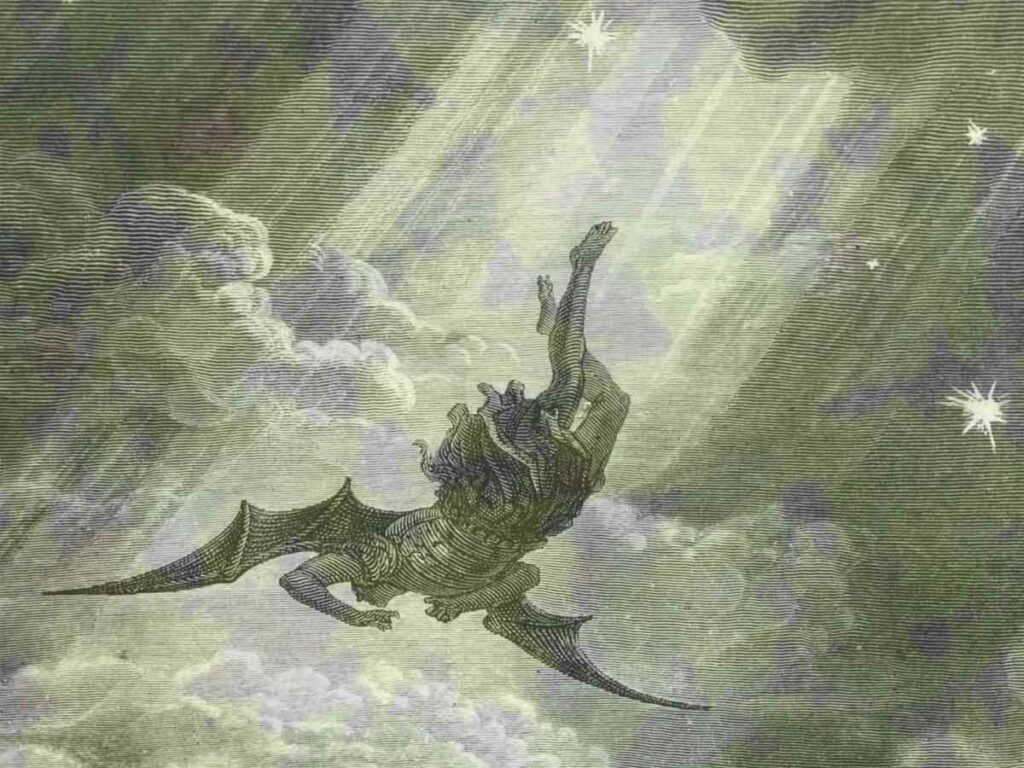Posted: July 2nd, 2023 | Author: Brett Stevens | Filed under: Order of Nine Angles | Tags: bill and ted, bourgeois, categorical imperative, lex talionis, lucifer, might is right, naturalism, ragnar redbeard, Satan, talion | Comments Off on Covenant of Lucifer

When the dust settles, future archaeologists will probably come to view our time as the era of conflict between naturalistic and urban philosophies. The former group like common sense, intuition, and natural order, while the latter like peer pressure and pluralism.
Naturalistic philosophies are based on natural order, or the way in which things work in nature that makes perfect logical sense despite being frightening (at first) to humans. Naturalistic types like social order that rewards good behavior and punishes bad.
Urban philosophies, often called bourgeois, are instead based on banishing the frightening and replacing it with the rules of human socializing. That is, you accept everyone and punish only those who upset the herd. Pluralism of this sort enables commerce and city living.
To naturalists, the urbanites seem to be insane, since by being tolerant, they allow bad behavior to slowly creep in and then become the norm, at which point civilization collapses. City people know little more than their jobs and social group, so they are oblivious to this risk.
Even more, cities breed people who are compliant and insensate to anything beyond their individualistic pursuits. As long as they have their jobs and stores, they are content, and they want no culture or natural order to restrain them from their vices and excesses.
Judeo-Christianity and the Abrahamic religions represent the farthest extend of the bourgeois urbanist philosophy. It essentially advocates mutual individualism, where each person does whatever they want as long as they tolerate others doing the same, and society funds these pursuits.

The bourgeois mentality involves means-over-ends philosophy based in following rules and procedures. As long as what they are doing fits within the law and they pay taxes, who cares why they do what they do, or what its long-term consequences are?
Jews seem to provoke lots of nasty behavior, so it makes sense to debunk them: they are merely mixed-race people selected for IQ by a few religious edicts. Comprised of Italian women and Asian men who later incorporated North African through Arab relations, they are the ultimate mutts.
Their religion, cobbled together from the ideas of Greece and Babylon with the controversial parts taken over, is based in moralism, or intolerance for those who are not individualists. Judaism is compensation for the crisis of mixing races, attempting to fix a confused situation.
The bad reactions to Jews generally come about because diversity fails in all forms, and Jews as a high-IQ group shaped by commerce are competent diversity, which makes them a threat. Much stupid murder and violence came about through the resentment thus engendered.
History tells us that the Jews arose at the intersection of trade routes between Europe, Asia, and Africa and their genetics reflect this. So does their culture, which emphasizes intelligence and moralism, making them a formidable competitor.
Birthed of commerce, Judaism as a religion, culture, and ethnic group emphasizes commercial morality. That is, you endorse individualism so that people buy your stuff and to baffle the herd with rules that make it easy to circumnavigate them. All individualists do this.
In this sense, Judaism is the ultimate expression of the bourgeois religion, but Christianity translated Judaism into a more idealistic and less racially-centered philosophy. For this reason, it infected the world because it was an easy answer for keeping the proles in line.
Bourgeois morality, because it is based in individualism, emphasizes the “Golden Rule”: do unto others as you would have them do unto you. This allows mutual individualism and avoids interrupting commerce and socializing with questions of what is right as a forward-looking goal.
Instead it is defensive. Religions of this nature consist of rules, since they are means-over-ends and not ends-over-means philosophies geared toward the why and long term, most of which focus on protecting the individualism of others.

The rabid surfacing of Judeo-Christianity — dislike of homosexuals, personal relationship with God, and a raving egalitarianism that finds abortion appalling but sees the poor as simply lesser people — exists merely to conceal its core, which is a me-first philosophy based on narcissism.
Most likely this transition came about because of a great cataclysm long ago described by Plato when people forgot about transcendent forward goals and instead focused on pluralism so that society could maintain minimum function. Naturalism carries forth the search for the transcendent.
Christianity, by its nature of dividing the world into Heaven-like purity and Earth-like impurity, does not embrace the transcendent but in fact rejects it. All bourgeois philosophies do this: they ban certain methods that are feared in order to induce obedience in the rest.
This went farthest with Political Correctness, which admitted that it wanted to ban certain words and ideas so that people would choose from what remained, forcing them into a mentality compatible with egalitarianism and therefore, programming their minds for control.
Numerous people have tried to reprogram individualism into something better. American rugged individualism emphasized self-sufficiency; Bill and Ted demanded we be “excellent” to each other, not just equal; Kant suggested we act as if our actions became “universal maxim.”
These differ from the Golden Rule in that they are not individualistic. Excellence means more than treating people fairly, but making the whole of society excellent. Universal maxim refers to how the world works, not merely an interaction between people.
For example, under the Judeo-Christian view, you tolerate criminals in the hope that their equal souls someday get their act together. In the Kantian view, you remove threats; in the Bill and Ted view, criminals conflict with excellence and presumably would be removed.
Naturalists would say however that this needs to go even further. In order to maintain excellence and competent universal maxim, order is needed, and order must defy individualism: some humans are good and useful, where others are malevolent, cowardly, subversive, or incompetent.
Luciferians and Satanists add naturalist morality back into the Christian “be nice to everyone” and the Bill, Ted, and Kant “act for excellence as a universal maxim,” bringing in the ancient rule known as the Lex Talionis, or the Covenant of Lucifer:
talion, Latin lex talionis, principle developed in early Babylonian law and present in both biblical and early Roman law that criminals should receive as punishment precisely those injuries and damages they had inflicted upon their victims. Many early societies applied this “eye-for-an-eye” principle literally.
In ancient Palestine, injury and bodily mutilation, as well as theft, were considered private wrongs. As such, the matter was settled not by the state but between the person who inflicted the injury and the one injured, an attitude that also prevailed in early Rome. Talion was the ultimate satisfaction a plaintiff might demand but was not mandatory; the injured person could obtain satisfaction with money if he wished.
On the principle that two different persons could not have exactly the same bodily members, the Palestinian sages enacted a law by which the injured party could not demand an eye from the person who caused the loss of his eye but could demand the value of his eye. This led to the abolition of talion in Palestine. By the 5th century bc in Rome, fines known as delicts had begun to replace talion in many instances, though the concept of talion did reemerge in medieval Germany and in some areas of Scandinavia in the 17th and 18th centuries.
The ancient Arabs in Palestine, who are partial ancestors of the Jews of today (along with minority Berber, Han Chinese, and Italian), changed the law from punishing the bad to fining the bad, at which point bad became accepted as a form of good, so long as the tax and remuneration was paid.
As the historical view shows us, times of greater sanity like the medieval era showed a return of the Law of Talion. It turns out that tolerating the bad means that they keep doing bad, and like Hillary Clinton, you may rarely if ever catch them red-handed.
Read most properly, the Law of Talion states a need to remove those who are bad or so incompetent that they cause injury. This law was probably itself a degraded remnant of the ancient Indo-European idea that criminals, incompetents, retards, and the insane were killed to keep population health.
In this way, the ancient rule united morality and eugenics in a realistic system that opposed the universal tolerance based in individualism of the bourgeois urbanites. Instead of keeping the bad around, the ancient world simply removed them.
Ironically this produced the closest humanity has come to equality of ability and therefore, approximate equality of outcome. When you remove the incompetents and criminals, everyone else has roughly the same abilities and therefore is able to succeed. You have no underclass of ineptitude.
All modern systems represent an attempt to make the urbanist rule work, where those who think clearly want the naturalistic one. Like all figures of the occult, Satan represents a Promethean who brings an unpopular truth to a humanity in narcissistic denial.

The Covenant of Lucifer enables us to understand the infinite wisdom of Darwinism. Try everything; keep what works. The creatures that adapt and sustain themselves are functional, but those that are dependent on the cities are not, including the incompetent, bad, insane, and so forth.
The O9A recognizes the need for preemptive Law of Talion through culling purges of the bad and incompetent (these terms are roughly conflatable, since the incompetent create bad results, and the bad promote incompetence so they can hide their bad deeds).
The Darwinistic aspects come from the recognition that with permanent civilization humanity needs a replacement for natural selection. About a fifth of every generation will be born bad, whether from mutation or low character of the parents, and they must be sent away or otherwise removed.
When understood properly, the Lex Talionis is not about revenge, but about raising the cost of bad behavior. It is intolerance in its purest form: those who work toward our shared goal are good, where those who thwart our goal, whether intentionally or not, are an enemy.
It answers the question of “Might is Right” versus “everyone is a precious snowflake” by saying that order and function are right. Whatever increases our function as individuals and civilization is good, and that which impedes it must be removed.
Naturalists see nature as pure function and therefore, find transcendental beauty in function and an equivalent to evil in dysfunction. Whether this is sweeping the streets or organizing civilization toward greatness, this naturalism promotes the strong and smashes the weak.
To us, removing the weak is a good thing; it removes impediments to the good and allows it to become more good, just like removing everyone under 115 IQ points means that the remaining people are roughly similar in intelligence and able to cooperate more fully.
City people advocate mutual tolerance. This makes sense to those who live in fear. However, mutual tolerance means accepting bad elements that have not been described by law, and those eventually take over, which is why all great civilizations so far have collapsed into third world level ruins.
Those of us who gather under the banner of the Magus recognize that life should be feared but embraced; this is the transcendent view, which says that nature and the cosmos are not just functional but optimal, and in their wisdom we can find some for ourselves.
By embracing the Covenant of Lucifer, we proclaim that we are ready for an infinite future and a society which will rise higher than any before. It says a great deal about those who oppose us that they fear this eventuality.
Posted: September 19th, 2022 | Author: Brett Stevens | Filed under: Nihilism | Tags: anti-realism, consequentialism, egalitarianism, lowest common denominator, Nihilism, radical realism, Satan, skepticism, solipsism, waste humans | Comments Off on Total Nihilism

Nihilism receives a bad rap because in the vernacular it means “belief in nothing,” and people focus on the nothing instead of the belief. A nihilist is skeptical of all human truths, values, and communications because they are manipulative.
Most nihilists recognize that we find ourselves in a species in the midst of committing suicide. Instead of raise itself to higher standards, it opted for tolerating the lower, and now it is inundated in the insane, psychopathic, idiotic, sociopathic, perverse, and criminal.
Nature does this to species that cannot gain control of themselves with a replacement for natural selection. If you do not remove the waste humans, they swamp you. Societies die by being able to subsidize parasites, and those then take over.
As we like saying around here, either the best oppress the rest, or the rest oppress the best. The former leads to some grimness, but the latter leads to getting bred back down into rodents. You either kill the weak or they kill you.
That sort of talk scares even the best of our people into submission now because they have grown up afraid of gulags, guillotines, and Nuremberg trials, so they are unwilling to entertain any anti-egalitarian thought.
Instead they depend on the idea of universal truths, values, and communications so that they can avoid conflict so that the Herd does not exterminate them. This is most of what motivates most people surviving above the subsistence level today.
To get past this insanity — note: it strikes only prosperous and high-IQ societies, since others never made it up Maslow’s pyramid to even consider the question — we have to first become nihilistic.
In that sense, nihilism is the only morality, and the only path to sanity. Humanity is stuck in a mental feedback loop of its own solipsism and can only escape through From total nihilism:
Most people find it odd that I am a nihilist. I am fond of religion, believe strongly in a personal morality, enjoy caring for things and people, am bonded to culture, and am deeply conservative in that anarcho-monarchist way that focuses on the big stuff and leaves everyone alone in their personal lives. None of what I do fits into the normal silos that people use to categorize people like hashtags — #vegan, #evangelical, #neocon, #hipster, #farright — and so half of them ignore me. The other half recognize an actual threat from someone who can diagnose the pathology behind their purported ideologies and faiths, and therefore show them their emptiness. Whether you wield it or not, emptiness is the primal weapon.
As a nihilist, I am a priest of emptiness. That is, I want to clear away all false somethings and replace them with emptiness so that I can fill it, much like how forest fires destroy the accumulated leaf, wood, and animal detritus, leaving behind cleansing ash that imbues the soil with lots of carbon for future organisms to use. Death and destruction of the irrelevant (has no use to anything but itself) and unintelligent (cannot adapt to anything but its own desires) is part of nature, both natural selection and periodic cleansings like plagues, storms, fires, and outbreaks of ice weasels that seek to bite our carotids and then eat our delicious, rare, soft, and flavorful eyes.
Most people are fake and unstable because they suppress the knowledge of how fake they are. They want to ingratiate themselves to you and make you feel good, so they only show you the safe/good sides of life. I am like nature; I am both storm and balmy day, both predator and cute furry bunny, both life and death. These are not “of” me, but “in” me as they are in you, because we are parts of nature. I created nothing, merely discover it, and to my credit, am honest about what I see and have learned. Most of humanity falls down on that latter point but let us face it, honesty is the ultimate luxury, something you can only do if you have a healthy self-esteem, willingness to steal time from the karmic drama of society and commerce, and enough extra cycles on your forebrain AI to spend turning over ideas like a Lament Configuration in your hands.
Some might say this is duality but the key to my mind (and to me) is that it is a singularity: time exists, so things run in cycles, which requires one cycle going forward and one going backward. In life, the forward cycle is creativity, conservatism, continuity, productivity, procreation, and civilization; the backward cycle is commerce, socialism, novelty, salesmanship, egotism, and parasitism. If someone were aiming to live in a balanced way, therefore in equilibrium with themselves, they would march on the forward cycle but limit its excesses to avoid sliding into the death cycle. Basically stopping time by avoiding the decay, even though one cannot stop time and therefore it will manifest in small (and more interesting, more local) ways.
You cannot worship God without also giving praise to the Magister; you cannot praise Satan without acknowledging the role of God (and you cannot believe in God, properly “godhead,” without believing in The Gods like a good pagan, since all three — unconscious universe, conscious but amoral gods, and guiding spirit of forward motion in love and death — must be there for the universe to function on a metaphysical level). You cannot praise art without praising those who fund art, and you cannot end poverty without ending the cause of poverty, probably with natural selection, including wolves soaked in blood howling at the moon as they feast on the corpses of the weak, stupid, criminal, insane, and perverse. This may be a scary universe, but it is a logical one.
Nihilism accepts both relativity and the whole of reality, which we only know through a heuristic, and know unequally and unevenly because we are not all one, we are not all the same person, and narcissism is a lie. That is, some of us may know it and write it down. The rest will see a YouTube video about it and pretend they know, but really every single person has their own degree of knowledge of reality (objective), their own ability to perceive it (Bell Curve), their own experience (destiny), and their own degree of gumption and honesty that makes them seem out more of the heuristic of knowledge (subjective). Nihilism says that there are no absolute truths, values, or communications, and this is realistic although blasphemous and heretical toward our Enlightenment-era (i.e. ancient and calcified) notion of “equality.”
It is important to note the basic definition of nihilism is itself cryptic; we can grasp the basics, but it requires more interpretation, and like all elephant in the room style Big Issues, almost everyone gets it wrong:
Nihilism is the belief that all values are baseless and that nothing can be known or communicated.
I rephrase it this way:
Nihilism declines to accept the social belief that universal values, universal truths/knowing, and universal communications exist.
We do not negate; we simply refuse to participate in the herd drama. As I recently wrote in a pipe-smoking analysis:
All philosophies are conjectural except commonsense realism, and therefore, are threatened by other conjectures.
Somewhere in between the human categories we can find a truth: people are not the same, nor do they have the same wisdom or needs, therefore there cannot be one standard of tobacco, truth, values, or communications. All we can do is pass on what we know, unlocking our word hoard to communicate as well as we can, hoping that our suffering leads to conclusions which can save others the same suffering so that they can move on to new suffering, therefore increasing the sum total of human knowledge.
Our minds settle on the tangible whenever they can. We like broad categories, square grids, equal divisions, and integers. Nature works in clines, curves, individuals, and ratios; these do not break down into “easy” for humans most of the time.
In other words, you can compile knowledge, but it is esoteric, meaning that per the Dunning-Kruger Effect, only those who have the ability to recognize it, are ready psychologically to recognize it, and know enough about its precursors and prior causes to recognize it, are going to even know what it is if they stumble across it. Imagine a primitive hominid discovering a lump of refined uranium on the jungle path on his way back to the cave; he will not make an atomic reactor out of it. He might use it to bash nuts. It will probably kill him because he does not know what it is, but the smartest hominids will look at something they do not understand and have no way to recognize and nope the heck out of there.
A nihilist is a heretic. By nature he will blaspheme all acknowledged truths as a means of testing the strong ones and identifying the weak, which he will destroy. A nihilist understands emptiness; he is the only one in human societies based on pretense and egotism who can recognize emptiness. To everyone else, emptiness is fullness because it allows them to project their egos all over it, which because they do not know what they are flirting with, will probably destroy them in one way or another. A nihilist recognizes emptiness for what it is and treats it seriously. No wonder we are arch-conservative, devoutly religious, unwilling to judge individuals, accepting of eccentricity and variation, skeptical of commerce, distrustful of altruism and compassion, and otherwise the type of logical commonsense realist that humanity needs and therefore will never recognize.
We are the heretics against a failing order and its illusions. Unlike the godly and “compassionate” egalitarians, we believe in the potential of humanity, which requires clearing aside the waste humans.
This can be done as our ancestors did, with a caste system, instead of through some modern method like feeding them into wood chippers, but if we do the latter we can compost them and distill the results into high octane liquors. You decide which you think fits best.
Nihilism brings an extreme skepticism not of the world, but of what humans consider to be the world, which is reality as tokenized into human symbols that represent our fears of conflict, death, and insignificance more than a sane and level-headed depiction of the world.
This extreme skepticism, a type of radical realism, gets us past the insanity that is killing us by making us worship humanist illusions instead of nature and the divine, which are written more in potential than in tangible, material, and symbolic objects:
Nihilism struck me one day as an antidote to the complete insanity of adults around me, who I observed were tormented by death. Alone in the forest, I suddenly felt that everything was in the hands of benevolent force of life itself, and that the tension between the tangible and the present moment and the unpredictable, estimated, approximated, ambiguous, and mysterious future and distant consequences of our actions was the driving force behind humanity.
To address this, I invented my homebrew nihilism from what I knew at a young age: the woods, and what I had seen in other humans and could test in myself. This nihilism consisted of a simple statement, which is that reality was both the tangible and intangible, comprised of a fusion between what we might call natural law and logic, using the ecosystems of the forest as a guide. It was based on life, in rejection of human life and the triad of universals — values, morality, and truths — which took the place of the one consistent and therefore real thing, which was external reality itself. It rejected humanism and the manipulative nature of human control, and favored understanding the logical chains of events and the reasons why things happened as they did.
Like most things I write, this philosophy is 60% borrowed from my influences (if you have read Plato, Burroughs, Eckhart, Schopenhauer, Kant, and Nietzsche you have the basics) and 40% entirely of my own creation in a form that I have found nowhere else. It is simply my framework which encloses the knowledge of the past in the unique perspective that apparently only I can bring to the discussion. Since those days, I have endeavored to understand that moment of clarity in the woods, and thrashing toward that clarity through a stream of words.
Lucifer, like nihilism, represents the rejection of the human world in favor of the natural world, which because it offers potentials, allow us to see what we might be able to have instead of what we have now, even if it requires painful sacrifice to get there.
Culling is not a sacrifice like in Hollywood Satanism, but a removal of the irrelevant because it is a threat like cancer or sepsis, and the real sacrifice is within ourselves as we adapt and change our personalities, emotions, and desires to fit what is real.
Only by doing this can we escape the force that is destroying humanity as is expressed in many philosophies and dogmas, solipsism or the belief that our tokens of the world are more real than the world itself.
The Christian doctrine was a simplification of the Greek idea that in reality, idealized “forms” repeat themselves and that we must distinguish appearance from discernible reality, or the abstract similarity between repeated structures and their derivation as responses to the same needs. In Greek logic, a chair was a design response to a need to sit; it did not exist as abstraction, nor was invented — it was simply the easiest logical response to the need.
As this doctrine filtered through politics, or the need to motivate people for earthly ends, it got simplified. Instead of forms being patterns emerging from the forces of nature interacting, and having an informational basis, they were presumed to be derived from a God and Heaven which was perfect and existed outside of this world, and were real, perfect, pure things.
Part of this simplification was the idea that the soul was separate from the body, and that the body was an inferior form, so we should be judged on our souls, which are in the eyes of God equal because they come from this imperfect world and not the perfect other one. “Blessed are the meek, for they shall inherit the Earth,” Christ said, reminding us that all souls were equal in the eyes of God.
There is neither Jew nor Greek, slave nor free, male nor female, for you are all one in Christ Jesus. (Galatians 3:28)
In this new view, there was no discernible reality in which the abstract traits and abilities of humans placed them in a role; this was replaced entirely by the equality of souls. In this way, appearance and abstraction were joined using the simplest possible device, which replaced the idea of cause and effect (person is good at math, so becomes a mathematician) with humans as cause of all things (if you want to, be a mathematician).
Nihilism rejects universalism, which is the shared consensual hallucination caused by individuals projecting together what they want to believe is true, which because it is conjectural inevitably results in them banning, censoring, and deplatforming anything else.
Realism is the opposite of universalist, moralist, and binary beliefs; it says that consequentialism, or measuring actions by their results and not the intention behind them, matters more than anything else.
A realist sees humanity as awash in its own illusions because it has created a taboo out of discussion of its fears, therefore it pursues only that which is left, which means the uncontroversial lowest common denominator that is always anti-realistic.
In other words, we are a species struggling against self-deception, and only by reaching out to nihilism and then further realism can we become sane again. This requires rejecting the Revolutions but first, rejecting solipsism:
Nihilism states the bare facts of life: nothing can be known because we relate to the world remotely through ourselves; nothing can be communicated because communication is a process of negotiation, where each side attempts to understand the other and comes away with its own version of what is being said; values are baseless in that they do not exist in reality, but comprise our response to it. We can argue that objectively better results exist but people can choose to deny that fact, or deny that better is indeed what they desire, and choose something else instead. The human struggle is one between narcissism and realism, and when narcissism wins out, people choose illusions over realistic responses. This is the most common state of human existence, hence the use of the term “common” as a type of lower rank.
The good understand why good is important, but no one else does; genetics trumps reasoning as usual and only some have the raw mental ability to understand what good is and why it is preferable to bad. Most people in fact prefer bad, whether mediocre objects and services in life, or disorganized society so that they may pursue their own vices, desires and personal profit. It does not occur to them that there will be an equal and opposite reaction as life re-arranges itself in response. Nor does it occur to them that they mark themselves by what they choose because it indicates the limits of their understanding, and that social rank comes from this process. We can say that the argument for goodness is objective, and be correct, but that has no bearing on whether or not it will be understood. The reality is that we deal with human beings, and they are only able to direct themselves toward what they understand. Most understand very little and so are prone to error, which is the root of “bad.”
Nihilism affirms this emptiness. Much like Lewontin’s fallacy expected race to be written in a single gene, the average person anticipates that life itself will have literal writing on the wall. The illusion arises from the fact that our world simply does what it does, objectively, but that our response to it must reflect our own interests as a species bent on survival, and that these vary between individuals based on capacity. This violation of blank slate theory and egalitarian dogma requires us to accept, snobbishly or not, that not all people are the same. Human responses are between subjective and objective because they depend on what the individual knows and can process, with some succeeding more than others. But only those who were going to succeed anyway know to pay attention what thrives and what does not, and to select one over the other.
Solipsism leads to individualism which in groups creates egalitarianism and from that, the idea of universal and absolute truths, values, and communications which are then used to enslave people and move them toward self-destruction.
If you wonder why every great human society has failed and been replaced by third world wastelands, this is the process that creates that result.
Nihilism requires that we reject the false god of ourselves as well as the false gods of Abrahamic religions and Leftist secular religions, and instead pursue the challenge of life itself:
Thematically, all of metal mirrors a horror movie: it shows humanity some new force which technology and society (which is a social entity) cannot address, and only the lone outsiders can think outside the box and come up with a solution, which they then apply independently of the social rules by which we live day-to-day. Think of your typical horror film. Ordinary people are stumbling through life, not particularly motivated. Some force arises which they cannot explain, and their first challenge is that _no one else believes them_. They have to get over the fear of social rejection in order to say what they see, and to take action while others stragnate. Then social means of dealing with the problem fail, as does technology, which requires them to invent a new way of tackling the problem. Death metal portrays society as this kind of mental fog which prevents action against actual but socially unrecognized threats.
The philosophical stance of death metal is a pragmatic realism with a long-term focus. Both of those ingredients are essential, since without the long-term focus pragmatism becomes appeasement to whatever trends is blowing through and makes itself convenient. It eschews the karmic drama of the individual that obsesses all rock and pop music. Instead, it focuses on the cause->effect relationships of history and other big and somewhat terrifying concepts. It’s about the results of our actions and the different choices we can make. This is more like human knowledge from the distant past, when civilization was new to us, and our goal was to achieve civilization, not “game the system” and live off what established civilization provides.
For these reasons, I refer to death metal as nihilistic. Most philosophies teach us that there is some “inherent” good and bad in life, usually to control us. Nihilism says there is no inherent value, purpose or communication. All is a choice. We can choose to murder all the intellectuals, or choose some other option. At first this seems like moral relativism, until you realize that the second part of moral relativism — “every choice is equally valid, and all must be accepted” — is not present.
As the old riff goes, the meaning of life is a tautology; the goal is to live, but that requires understanding how to live well, which is equal parts hard deterministic realism to adapt to reality and imaginative aesthetics of quality in order to discover beauty.
This is why Plato begins his discussion of politics with the question of the good life. We can survive with a few basic steps; however, how do we get ourselves to sanity so that we can enjoy life without living in constant neurotic fear?
Nihilists such as myself suggest rejecting the false universals we use to suppress those fears, accepting our fears instead and having compassion for ourselves in realizing that these fears are with good foundation, and then moving on to look at what is beautiful.
Our species remains mired in self-pity because people would rather play the victim than change their thinking, personalities, behaviors, or emotions. We focus on the fear, and this leads to linear thinking.
A nihilist might suggest accepting the fear as one input of many, looking at the bigger picture to derive patterns, and noticing that the spiritual and natural exist in parallel forms which suggest an underlying order tending toward goodness:
Parallelism suggests that decisions are made according to indicators found in parallel between multiple factors. This reduces the arbitrary nature of linear decision-making. As a corresponding notion, parallelism also suggests that structures exist in parallel throughout the universe. This includes the vertical dimension of complexity and the possibility of metaphysics. “As above, so below,” would be an expression of parallelism; another way to view it is that there are no structures in the cosmos which are radically incompatible with any others.
As such, parallelism is an attack on how most people conceive of religion. The average person is either (a) a materialist, believing that there is nothing but physical matter and thus enhacing physical comfort for people is the best goal (utilitarianism), or (b) a dualist, believing that there is some “other side” where all things are pure and clear and people will live in perfection in the order of God or gods. Parallelism suggests instead that any additional metaphysical dimension will resemble what is here, because in all aspects of reality, nature uses mirrored structures to create an architectonic or self-balancing order. The greatest is found in the least and vice-versa. It is a perfect design.
In addition, parallelism points out another structure in nature, which is a natural selection-like mechanism that is found in nature, but also in mathematics and thought. Roughly speaking, for any possible action there are many parallel impulses, and each one reflects a certain degree of maturation toward completeness of organization. The most organized tend to form a parallel harmonic level — imagine the parallels themselves as verticals, and a horizontal line being drawn where completeness of order occurs — and thrive, while others go away. Our thoughts are like this: we have many impulses in response to stimulus, and our brain selects those which are the most complete and which do not trigger any negative feedback loops.
Satan represents all the fears of humanity. This suggests that He is the gateway, and only by clarifying our minds with courage instead of cowardice and self-pity can we ascend to that gateway and rediscover the possibilities of life that lie beyond.






